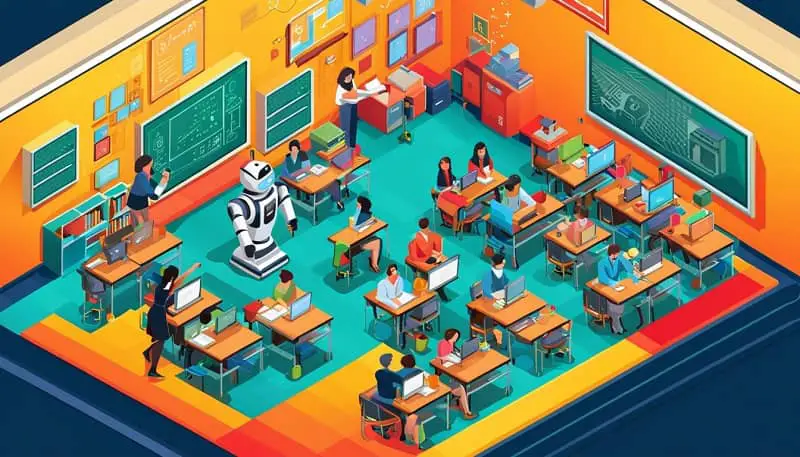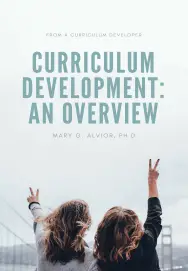
This article expounds on the definition of curriculum development. It also describes the importance of curriculum development in school, country, and society, in general. Read on to fully understand the meaning and importance of curriculum development in nation building.
Table of Contents
A curriculum is considered the “heart” of any learning institution, which means that schools or universities cannot exist without a curriculum.
Before I discuss the importance of curriculum development, let me describe to you first the meaning or definition of curriculum. The meaning and importance of curriculum development is discussed in more detail in two separate sections.
Meaning of Curriculum Development
Given the importance of curriculum development in formal education, the curriculum has become a dynamic process due to the changes that occur in our society. Therefore, in its broadest sense, curriculum refers to the “total learning experiences of individuals not only in school but society as well” (Bilbao et al., 2008).
Curriculum development is defined as planned, purposeful, progressive, and systematic process to create positive improvements in the educational system. Every time there are changes or developments happening around the world, the school curricula are affected. There is a need to update them to address the society’s needs.
Curriculum development is the planned, purposeful, progressive, and systematic process to create positive improvements in the educational system.

To illustrate this contention, let’s trace back history.

People taught their children knowledge and skills to survive by catching fish or hunting animals for food during ancient times. They had no formal education during that time, but their children learned and acquired the knowledge and skills for survival.
During that time, they already had a curriculum that other educators call as, the saber-tooth curriculum. This type of curriculum refers to a kind of curriculum that existed during ancient times in which the purpose of teaching was for survival.
However, when the effects of discoveries and inventions became inevitable, ancient people’s way of life had changed for the better. As a result, education became formal, and curriculum development evolved as systematic, planned, purposeful, and progressive.
Natalie Rivera recommends reading the book “The Saber-Tooth Curriculum” for a better understanding of how curriculum evolves. See the video below.
Importance of Curriculum Development
Curriculum development has a broad scope because it is not only about the school, the learners, and the teachers. It is also about the development of society in general.
In today’s knowledge economy, curriculum development plays a vital role in improving a country’s economy. It also provides answers or solutions to the world’s pressing conditions and problems, such as threats to the environment, issues on politics, socio-economic problems, and other issues related to poverty, climate change, and sustainable development.
There must be a chain of the developmental process to develop a society. First, the school curriculum, particularly in higher education, must be designed to preserve its national identity and ensure its economy’s growth and stability. Thus, the president of a country must have a clear vision for his people and the nation.
For instance, in the Philippines, if President Aquino wants the country to become the Asia-Pacific’s tourism hub, then the school curriculum must be developed along that line. Curricular programs for higher education can be crafted in such a way that it will boost the tourism industry in the country.
To illustrate further, different models may arise, such as edu-tourism, eco-tourism, cultural tourism, medo-tourism, biz-tourism, techno-tourism, agri-tourism, archi-tourism, among others.
If universities have innovative curricular programs and demand in the local or global markets, many students, even from foreign countries, will enroll. A higher number of enrollees would mean income on the part of the universities.
As a result, if the income is high, it can be used for teachers’ promotion, scholarship, and remuneration. It can also be used to fund research and development endeavors and put up school facilities, libraries, and laboratories.
I believe that the country’s economy can improve people’s way of life through curriculum development. And to develop it, curriculum experts or specialists should work hand in hand with lawmakers such as senators and Congress members, the local government officials, governors, and mayors. Likewise, business communities and industries and other economically oriented players in society may be engaged in setting and implementing rules and educational reform policies.
Hence, curriculum development matters a lot in setting the direction of change in an organization, not only at the micro but also at macro levels. As long as curriculum development goals and objectives are apparent in the planner’s mind, cutting-edge achievements in various concerns can be realized.
At this point, the meaning and importance of curriculum development is clear to you.
For additional information on curriculum development, I condensed the contents of primary textbooks on curriculum development in my eBook on Curriculum Development. See a brief description of the eBook by clicking on the e-book.
For more example on curriculum development, please read Edecolepmentalism: a Personal Philosophy of HIgher Education, and Translating the Edecolepmentalism Philosophy Into a University’s Vision, Goals, and Program Objectives.
Reference
Bilbao, P. P., Lucido, P. I., Iringan, T. C., and R. B. Javier (2008). Curriculum development. Philippines: Lorimar Publishing, Inc.
© 2014 December 13 M. G. Alvior | Updated: 12 January 2024





Thanks ALVIOR MARY G. Nice One My Dear.
Dr Mary thanks for being available. I have a question.
What is the importance of change and innovation in curriculum development?
Hello, Earnest. Change and innovation in curriculum development are essential. If there is a trend happening around the world, curriculum must change. It is also technology and industry driven. On the other hand, the change and innovation can be attributed to the ideas of curriculum developers. They can change the educational system or policy and that contribution can directly affect the society in general.
Hi Mary. I am really interested in any further research you have on curriculum
Hello, Sir Muhammad. Is there particular thing or topic that you want me to share with you?
As of now, I don’t have new but I want to popularize edecolepmentalism and lingoconomics.
1. https://simplyeducate.me//2014/06/09/edecolepmentalism-a-personal-philosophy-in-higher-education/
2. https://simplyeducate.me//2014/10/26/translating-the-edecolepmentalism-philosophy-into-a-universitys-vision-goals-and-program-objectives/
3.https://simplyeducate.me//2014/05/24/lingoconomics-an-emerging-theory-in-language-acquisition/
Thanks MADAM for your good lesson on curriculum development, be blessed.
Have got many important things from this article. Nimeelewa sana(Swahili). asante sana
Thanks ma you just had me got through with my assignment.
Hello madam, your article give me more knowledge. I pray for you to continue to write more articles.
Thanks a lot, Vicent. Please pray for my health. You can help us popularize the site in your place.
Dr Mary thanks for being available. I have a question.
What is the importance of change and innovation in curriculum development?
Hi, Ma’am Mary, what are some of the concepts of curriculum evaluation and implementation? Also help me on knowing the determinants of curriculum design!
Very educative article, pls keep the Ball rolling
Thank you Safiya. Please help us pray that we are given good health and time to keep this site. Help us also popularize this site in your country. Again, thank you so much.
Hi Dr Mary,I am a student curriculum specialist,and I recently wrote an essay about curriculum development process.Your article really helped me to go about the essay and understand the relevance of curriculum development .I owe the grade I got to you. Thank you,continue educating.I will be here to support
as curriculum student this piece of information was useful and i believe such article widening ours view more further as field of study.
Thank you so much, Amin.
Thanks ma,i really enjoyed reading your article.can you help tell me the factors that influence curriculum development?
thanks for your lesson
You are welcome Josephat.
Hi Ma’am,
I’d like to ask does Course of Study and Curriculum are the same?
Looking forward for your response.
Thank you.
Hi, Ricovil. Yes, curriculum and course of study are the same but course of study is only an example of curriculum.
thank you Mr. mary G. I am so happened with this article and starting the study from your contribute
Hi, Ishaq. I am Ms. Mary, I am a woman. You can address me as Ma’am Mary or Dr. Mary. You are welcome.
I like your articles on curriculum development Dr. Mary.How do I get more information on importance of curriculum development?
This is helpful material. We are developing a curriculum for early childhood development. We are using your notes aes a guide. Timothy
Thanks Timothy. That’s great, I can do a curriculum review 🙂
please I will like to use your medium to ask this question: With relevant examples, account for the development of the curriculum at the level of school administration in Ghana.
Hello, Peter. I’m not particular with the school system in Ghana. I think other readers can answer you. To our readers, you can probably help Peter.
just score a great grade wit the help of your article at school.
Wow! Thanks Abusufiyan.
Thanks
But i can see that your importance of curriculum development are based only on the economy.
How do students and teachers benefit from this curriculum development
Hello, Mulinzi. Yes, it is more on the economy and that’s the uniqueness of my article and idea. Now, it is getting popular. The idea is to craft a curriculum that would boost the economy. Once you know that kind of curriculum then find out how to make it beneficial to the teachers and the students. The bottomline is we need to prepare our students ready to work. Equip them with knowledge and soft skills as well. But in the future, we don’t need knowledge because robots can do our work. We only need soft skills.
Wow!this is quite interesting and enlightened. I would like to read more.
Thanks, Chidinma. Just explore this site and you can find my other articles.